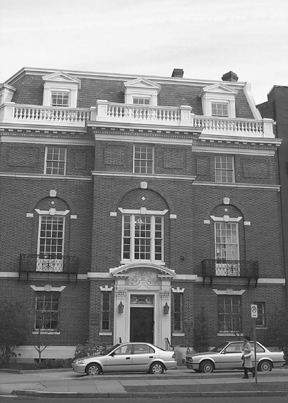
GHI Headquarters
The German Historical Institute (GHI) marked two important events this spring, as the AHA Council selected the GHI as its 107th affiliated society, and the board of trustees named Christof Mauch the Institute’s director.
Having served as acting director for over two years, Dr. Christof Mauch was appointed Director in January 2002. He received his doctorate at the University of Tübingen in modern German literature in 1990 and in 1998 received his Habilitation—the postdoctoral degree required for a professorship—from the University of Cologne in modern history.
The Institute supports the work of scholars from both the Federal Republic of Germany and the United States. “The German Historical Institute is a center for advanced scholarly study and research,” Mauch explains. “Its purpose is to promote investigation of the historical dimensions of contemporary German and American issues, and it also encourages study of topics from a comparative or global perspective.” Founded in 1986 by the German government, the GHI follows the tradition of German research institutes abroad. It is funded by the German government but completely independent in its activities. “The GHI,” Mauch notes, “is the largest institution of its kind in the United States.”
The goals of the GHI are: to provide a forum for transatlantic exchange of ideas; to encourage comparative and collaborative scholarship among various institutions in the U.S. and abroad; and to support young scholars as they pursue their research. Toward these ends, the Institute sponsors several international conferences, lectures, seminars, and symposia every year as well as a transatlantic doctoral seminar, a young scholars forum, a summer seminar in archival studies. It publishes a journal—The Bulletin of the German Historical Institute—and a series of research guides as well as publications series in collaboration with Cambridge University Press and Franz Steiner Publishers. For a complete list, go to https://www.ghi-dc.org/publications
The Institute has been housed in the historic 1911 Woodbury Blair mansion in northwest Washington, D.C since 1990. The institute houses a library that holds over 30,000 volumes and more than 260 serials pertaining to German-American relations and German history in both German and English, with a unique collection of regional German historical periodicals and archival finding aids. The library can be used by anyone and is open 9:00 am-5:00 pm from Monday to Friday. The library’s collection is cataloged on the GHI’s website at https://www.ghi-dc.org/library, and the reference guides can be reviewed at https://www.ghi-dc.org/research.
The AHA has enjoyed a long relationship with the GHI as a supporting member of the Friends of the GHI, which sponsors the Fritz Stern Dissertation Award, the Young Scholars Forum, the Friends Lecture, and the Witnessing History Program. The Fritz Stern Dissertation Award is awarded to the two best doctoral dissertations submitted in German history, German-American relations, or the history of the Germans in North America. The winners receive $2,000. Another program geared toward helping young scholars is the Young Scholars Forum. Each spring, the Forum brings together PhD candidates and recent PhD recipients to present their work to their peers and distinguished academics from the United States and aboard.
In addition to the programs sponsored by Friends of the GHI, the Institute offers short-term fellowships for doctoral and postdoctoral research in the United States. It is also a co-sponsor of the Jürgen Heideking Fellowship, which sends an American scholar to Germany each year, and the Kade-Heideking Fellowship, which brings a German to Washington, DC, and Madison, Wisconsin. For more information on the GHI’s fellowship programs, go to https://www.ghi-dc.org/programs.
The Institute hosts Spring and Fall lecture series, which bring leading scholars in a variety of fields to Washington. This spring, the lecture series focuses on the “Challenges to German Democracy, 1949—2001” Speakers and topics include Christiane Harzig (University of Bremen) on the issue of immigration in the Federal Republic of Germany; Ingrid Gilcher-Holtey (University of Bielefeld) on the international impact of the events of 1968; and Andrei Markovits (University of Michigan) on the postwar German Left.
For a detailed description of the German Historical Institute and their programs, visit them at 1607 New Hampshire Avenue, NW Washington, D.C. 202-387-3355. email: info@ghi-dc.org website: https://www.ghi-dc.org.

